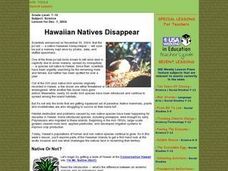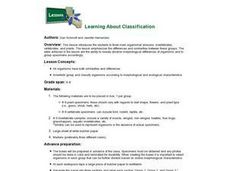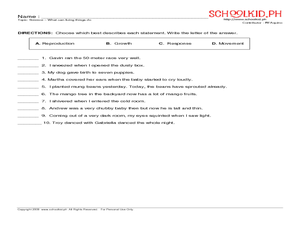Curated OER
Our Playground!
First graders observe and explore the playground's environment by walking around the playground, followed by a group discussion of what they observed. They then divide into groups and participate in centers, their brought back together...
Curated OER
A Seed for All Needs
Students identify uses for plants. In this agricultural lesson, students read the book Spring Gardening and distinguish between food plants and flowers. Students plant flower in cups as a follow-up activity.
Curated OER
Classifying Living and Non-Living Objects
Students investigate living organisms and define the properties of a living species. In this life characteristic lesson plan, students examine plants in their class and discuss whether or not they are alive. Students create a living...
Curated OER
Valentine's Day
Students create a flower, poem, and mailbox for someone to open on Valentine's Day. In this Valentine's Day lesson plan, students also write Valentine letters.
University of Wisconsin
A Rain Garden Year
Pupils become plants in an interpretive play that depicts what happens throughout the seasons in a rain garden. As you narrate, students bloom, flower, and go to seed accordingly. The lesson is first in a series of lessons written for...
Curated OER
Renewable vs. Non-Renewable Resources
Fifth graders, after brainstorming why conservation of resources is important, distinguish between renewable and non-renewable resources. They make a list of different types of natural resources on the board and then sort them into two...
Curated OER
Flower Power
Pupils investigate and explain the basic needs and life processes of plants. Key concepts include: living things change as they grow and need food, water, and air to survive. The reverse of the Kansas quarter serves as inspiration.
Curated OER
The Great Pollinators
Students discover the reproductive parts of a plant. In this biology instructional activity, students identify and categorize several different plants they dissect in class. Students record their information using a data chart.
Curated OER
Violets, Daffodils, Roses and Thorn
Fourth graders complete a variety of exercises and activities surrounding the scientific and artistic properties of the parts and processes of a plant/flower.
Curated OER
Hawaiian Natives Disappear
Students explore parts of the Hawaiian Islands to get a examine the exotic invasion, and see what challenges the natives face in reclaiming their territory. They identify the changes in the environment that have been the hardest on the...
Curated OER
Plant Parts and Functions
Fifth graders examine two or three unfamiliar flowers or fruits, such as eggplant and mango and realize that each flower or fruit comes from a flowering seed plant. They then identify the plants.
Kentucky School for the Deaf
Levels of Organization within an Ecosystem
From tiny organisms to entire biomes, young scientists examine the interdependent relationships tying all living and non-living things together with this collection of ecology resources.
Curated OER
Pollen & Pollination
Learners identify the different ways things are pollinated and how to manage pollen. In this pollination lesson students complete an experiment on how moths pollinate flowers.
Curated OER
Learning About Classification
Students explore the three main organismal divisions. Students classify organisms by invertebrates, vertebrates, and plants. They observe the differences and similarities between these groups.
Curated OER
Seed Germination
Students germinate a Mung Bean seed. In this seed activity students conduct an experiment germinating a Mung Bean. They apply three different treatments to the seeds: dry, moist, and underwater incubation.
Curated OER
Flowering Phenology: How Do Plants Know When To Flower?
Students explore the biotic and abiotic factors that affect plant reproduction and the potential consequences of human activities on plant populations. The effects of urbanization are discussed as an influence in the consequences.
Curated OER
Plant Reproduction
Fifth graders discuss the way a plant can reproduce from roots, stems, and leaves instead of the more familiar way of flowers, fruits, and seeds. In groups of four, 5th graders pick a plant group. Each group then writes a report,...
Curated OER
Flower Power: Kansas Quarter Reverse
Young scholars examine the Kansas quarter reverse and explore the basic needs and life processes of plants. They take a nature walk around the school and draw living and non-living things. In the classroom the sort the specimens...
Curated OER
The Japanese Garden
High schoolers use the internet to gather information on the Japanese Gardens. They discuss topics with a horticulturist and build a replica of the gardens at their school. They work together to identify different types of plants.
Curated OER
Science - What Can Living Things Do
In these living things worksheets, learners write true or false for the sentences about living things. Students answer the questions about living things and choose the words that best describe the statements about living things.
Curated OER
Stem Cuttings
Young scholars select the best non-flowering stems of plants and remove the leaves from the soon to be buried portion of the stem. They fill seedling flats with soil and insert the cuttings, label, and water.
Curated OER
Pollinator Habitats
Students read and discuss background information included with this lesson. They brainstorm the best sources for developing a list of native or migratory pollinators. Students work in groups to design habitats based on information...
Curated OER
Seed Structure and Seed Dispersal
Third graders plant seeds. In this seed structure lesson, 3rd graders identify parts of a seed and plant a lima bean seed. Students discuss and reflect on the process in their journals.
Curated OER
Seed Diversity
Students explore agriculture by researching different seeds. In this seed identification instructional activity, students collaborate in small groups to analyze a package of different seeds. Students utilize a magnifying glass to examine...

























